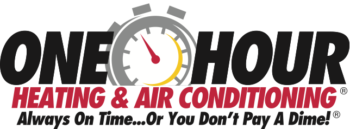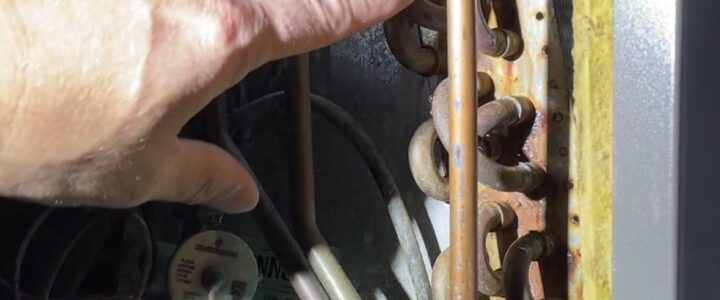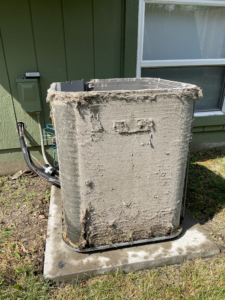In the realm of residential HVAC systems, the air conditioner coil plays a vital role in maintaining your indoor comfort. However, over time, you might encounter a rather common and frustrating issue – refrigerant leaks. These leaks can lead to reduced cooling efficiency, increased energy bills, and an overall uncomfortable environment. We’ll delve into the intricacies of how an air conditioner coil, attached to the indoor furnace, can develop refrigerant leaks, and explore a solution that holds promise for improved longevity and performance.
Where is Your Air Conditioner’s Coil Located?
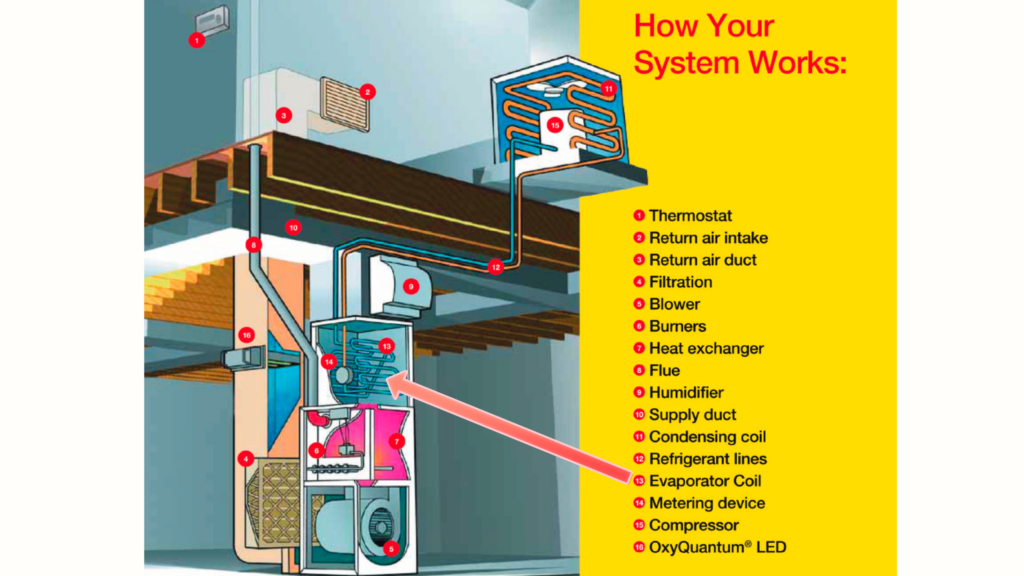
Found either within the air handler or attached to the furnace, this coil is nestled within the ductwork or plenum of your home. Its concealed location ensures that the coil efficiently absorbs heat from the indoor air, playing a crucial role in the cooling process.
How Does the AC Coil Work?
As warm air flows over the coil’s cold surfaces, the refrigerant within the coil evaporates, absorbing heat and subsequently cooling the air before it’s circulated back into your living spaces. This fundamental process underscores the significance of the evaporator coil in maintaining the comfort and climate control of your home.
This coil facilitates the transfer of heat from inside your home to the outside environment by using refrigerant – a specialized fluid that undergoes phase changes to absorb and release heat.
How Evaporator Coil Holes Lead to Refrigerant Leaks
Refrigerant leaks can stem from various sources, and one common culprit is a hole in the evaporator coil. When a hole forms in the coil, whether due to corrosion, wear and tear, or other factors, it creates a pathway for the refrigerant to escape. This compromised coil allows the high-pressure refrigerant to leak into the surrounding environment. The result is not only a loss of cooling efficiency but also a potential environmental concern. Detecting and repairing such leaks promptly is crucial to restoring the system’s performance, maintaining optimal energy efficiency, and minimizing the impact on both comfort and the environment.
VOCs in the Air: An Often Overlooked Culprit
One factor that might contribute to coil leaks is the presence of volatile organic compounds (VOCs) in the air. VOCs are emitted by a range of household products like cleaning supplies, paints, adhesives, and even certain types of furniture. When these compounds come into contact with the coil’s surface, they can lead to a chemical reaction that corrodes the coil over time, causing leaks.
Dissimilar Metals: A Potential Cause of Evaporator Coil Leaks
In our experience, we have noticed that AC coils that utilize dissimilar metals are more prone to developing leaks. This phenomenon is due to a process called galvanic corrosion, where different metals in contact with each other can create a flow of electrical current, leading to the deterioration of one or both metals. This corrosion can compromise the structural integrity of the coil, resulting in tiny openings that allow refrigerant to escape.
Precision Leak Detection: Unveiling Evaporator Coil Leaks
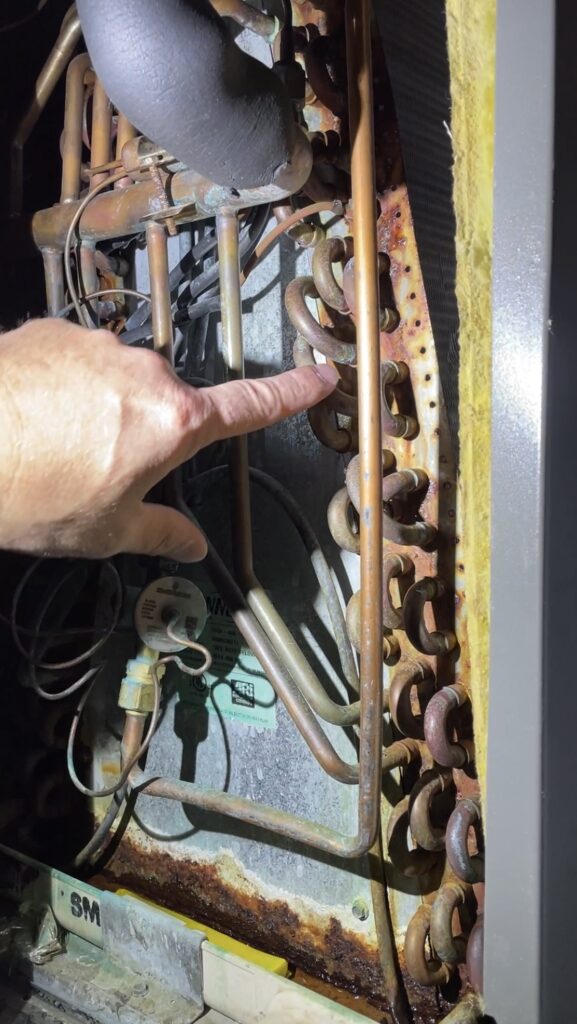
An experienced HVAC service company employs a range of advanced techniques to accurately detect leaks in your evaporator coil. One of the primary methods involves using electronic leak detectors, which can sense the presence of refrigerant escaping from even the tiniest holes.
HVAC service professionals at One Hour Heating and Air Conditioning pinpoint the location and severity of leaks swiftly and accurately, ensuring timely repairs and optimal system performance.
The All-Aluminum Solution
To mitigate the risk of refrigerant leaks caused by galvanic corrosion, HVAC technology has evolved. Newer coils are often made entirely of aluminum, eliminating the potential for dissimilar metal interactions. Aluminum is highly resistant to galvanic corrosion, making it an ideal choice for coil construction.
Benefits of All-Aluminum Coils
- Enhanced Longevity: With no dissimilar metals in contact, all-aluminum coils are less susceptible to galvanic corrosion, leading to a longer lifespan for the coil and the entire HVAC system.
- Efficiency Boost: Reduced risk of leaks ensures that your AC system operates at peak efficiency, effectively cooling your home while saving energy and reducing utility costs.
- Peace of Mind: Installing all-aluminum coils brings homeowners peace of mind, knowing that they’ve invested in a durable, reliable, and long-lasting solution.
Understanding the intricate relationship between your air conditioner’s evaporator coil and refrigerant leaks is pivotal in maintaining the efficiency and comfort of your home’s HVAC system. By installing all-aluminum coils, you’re proactively addressing the potential for galvanic corrosion, ensuring a reliable cooling experience for years to come. One Hour Heating and Air Conditioning in Olathe, KS, is committed to quality and innovation in our choice of materials, benefiting both our customers and the environment.
Remember, regular maintenance, timely repairs, and informed decisions can make a substantial difference in the performance and longevity of your HVAC system. Stay cool, comfortable, and informed with One Hour Heating and Air Conditioning, your reliable partner in residential HVAC solutions.
